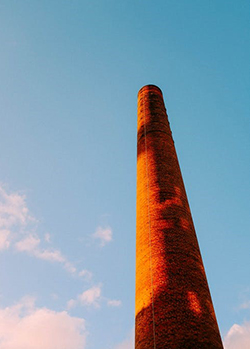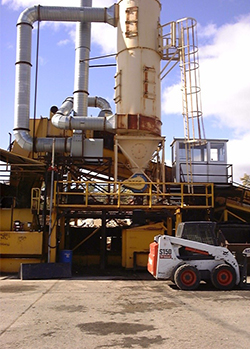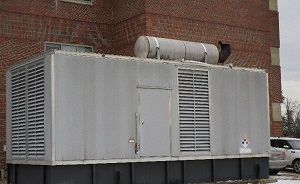Permit Guidance
Air Permitting for Stationary Sources
Sources of air emissions which require permits include point sources (major stationary commercial and industrial facilities), area sources (generally small, but numerous, stationary sources like spray painting operations and print shops), and devices (manufacturing equipment, fuel burning devices such as boilers or emergency generator/fire pump engines, etc.). Read more about what sources require a permit in ARD-17, “New Hampshire’s Air Permit Program.”
 New Construction Permits
New Construction Permits
Permits that are issued prior to construction/installation of a new device, or modification to an existing permitted device. NHDES provides guidance documents for those seeking new construction permits.
-
Temporary Permits
A temporary permit is issued prior to the commencement of construction or installation of any new or modified source or device. A temporary permit is issued for a period no longer than 18 months and contains terms and conditions establishing the parameters under which the source or device is constructed or operated. A temporary permit is issued to sources or devices based on several criteria including the source or device type, design ratings, levels of production, and annual emission levels. A temporary permit is the first step toward obtaining either a State Permit to Operate or a Title V operating permit. -
New Source Review (NSR) and Prevention of Significant Deterioration (PSD) Permits
The New Source Review (NSR) is a preconstruction permitting program serving to establish and document air pollution emission limitations from large, or “major,” sources of air pollution. NSR includes two primary permitting programs: Nonattainment NSR (NA-NSR) and Prevention of Significant Deterioration (PSD).NA-NSR applies in nonattainment areas, which are areas where the air quality is classified as not meeting the National Ambient Air Quality Standards (NAAQS) for one or more criteria pollutants regulated under the Clean Air Act. NA-NSR review and permitting is intended to allow construction of new or modified sources of air pollution in these areas while still making progress toward attaining the NAAQS.
PSD applies in attainment areas, which are areas where the air quality is classified as meeting the NAAQS. PSD review and permitting is intended to allow construction of new or modified sources of air pollution in these areas while protecting (i.e., not significantly degrading) air quality.
 Operating Permits
Operating Permits
Permits that are issued when construction is completed and Temporary Permit conditions have been satisfied. NHDES provides guidance documents for those seeking operating permits.
-
State Permits to Operate
A state permit to operate is issued to sources that have completed construction, started operation and demonstrated compliance with all applicable air regulation. A state permit to operate is issued for a period not to exceed 5 years. A state permit to operate contains the emission limits and any other conditions the source is required to meet to ensure that the operation of the source will not result in a violation of any air quality standard or regulation.State permits to operate are issued to sources or devices which were required to hold temporary permits, and:
- Are not subject to the Title V operating permit program; or
- Are choosing to limit their potential emissions to a level below the major source threshold which would trigger a Title V operating permit (called a “synthetic minor source”).
-
Title V Operating Permits
Title V Operating Permits are issued to sources, called “major sources,” which emit or have the potential to emit the following pollutants at the levels specified:- 10 tons per year (TPY) or more of any one hazardous air pollutant;
- 25 TPY or more of any combination of hazardous air pollutants;
- 100 TPY or more of NOx for sources located in Belknap, Carroll, Cheshire, Coos, Grafton, and Sullivan Counties;
- 50 TPY or more of NOx for sources located in Hillsborough, Merrimack, Rockingham, and Strafford Counties;
- 50 TPY or more of VOCs; or
- 100 TPY or more of any criteria pollutant (e.g. sulfur dioxide).
Other sources, including area sources, may also be required to obtain Title V Operating Permits if they are subject to federal requirements relating to new source performance standards, hazardous air pollutants, or acid rain control. The Title V operating permit program, effective June 30, 1995, is a requirement of Title V (Permits) of the federal Clean Air Act Amendments of 1990. Title V operating permits are issued for a five-year period.
 Alternative Permits
Alternative Permits
Streamlined permit process for emergency engines and rock crushing operations, in lieu of obtaining a state Permit to Operate. NHDES provides guidance documents for those seeking operating permits.
-
General State Permits (GSP)
A General State Permit is issued for emergency engines (those used as emergency generators or fire pump engines) for a period not to exceed five years. These sources may choose to comply with the terms and conditions of the General State Permit instead of obtaining a State Permit to Operate. A source seeking to operate under a General State Permit needs to submit a registration package. Paper forms for the General State Permit registration are listed with the Air Permit Application Forms. Or, sources can submit applications electronically for the General State Permit (GSP) for owners of Emergency Engines. -
Permit-by-Notification (PBN)
A permit-by-notification is available for non-metallic mineral processing plants (rock crushers). A source that falls under the permit-by-notification category may choose to comply with the permit-by-notification procedures and requirements for the category instead of obtaining a temporary permit or state permit to operate. Paper forms for the Permit-by-Notification registration are listed with the Air Permit Application Forms. Or, sources can submit applications electronically for the Permit-by-Notification (PBN) for owners of Non-Metallic Mineral Processing Plants (Rock Crushers).
Air E-Permitting for Alternative Permits
Owners or operators of New Hampshire companies subject to certain air permit programs can submit information as part of the Air E-Permit application system on the OneStop website. To use it, applicants must first be registered to be a “OneStop Data provider.” If you have any questions regarding becoming a OneStop Data Provider and obtaining passwords and PIN, please contact Andrew Cornwell at (603) 271-6974 or Andrew.Cornwell@des.nh.gov.
-
Administrative Amendment – Update Facility Information
The Administrative Permit Amendment process allows permit holders to submit up-to-date facility and contact information. If you need help on this feature, please contact Meg King at (603) 271-6796 or Margaret.M.King@des.nh.gov. -
General State Permits – Emergency Generators
Sources can submit applications electronically for the General State Permit (GSP) for owners of Emergency Generators. If you need online application help, please contact Ash Bustead at (603) 271-6828 or Ash.L.Bustead@des.nh.gov. -
Permit-by-Notification – Non-Metallic Mineral Processing Plants (Rock Crushers)
Sources can submit applications electronically for the Permit-by-Notification (PBN) for owners of Non-Metallic Mineral Processing Plants (Rock Crushers). If you need online application help, please contact Ash Bustead at (603) 271-6828 or Ash.L.Bustead@des.nh.gov.
How do I find an air permitting or modeling consultant?
While NHDES cannot provide recommendations for consulting companies, we do provide a list of consultants who have submitted air permit applications and/or modeling analyses to NHDES within the past year.




